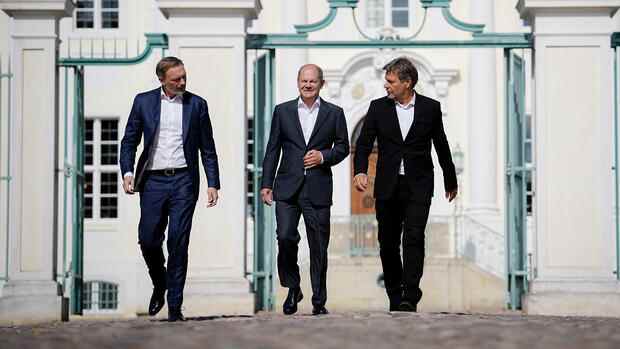The politicians announce further relief.
(Photo: dpa)
Meseberg Chancellor Olaf Scholz (SPD) is promising massive “precise, tailor-made relief” in view of the high prices for electricity and gas. The federal government will “soon complete” the work on a relief package for citizens and companies. Scholz left the question of when exactly the federal government would present the relief package unanswered.
With a view to the dramatically increased gas and electricity prices, Scholz said that the federal government would help “to ensure that prices do not go through the roof”.
Federal Finance Minister Christian Lindner said that the “massive package” to relieve the burden would be aimed at the whole spectrum of society. The FDP politician still sees scope for relief for citizens in the single-digit billion range in the budget for 2022. Among other things, this is due to tax revenue, which is increasing more than expected. In 2023 the scope will be even greater because precautions have already been taken here. Lindner spoke of a two-digit billion amount.
At the same time, however, the roots of the high energy prices must be tackled. There is speculation on the electricity markets and also a kind of “return autopilot”. These rules mean that rising gas prices automatically lead to rising electricity prices and thus to extra profits, especially for providers of green electricity, which is actually cheap.
Top jobs of the day
Find the best jobs now and
be notified by email.
Lindner also spoke out again against a special tax on excessive profits from energy companies. Other European countries would have problems with such taxes. One must rule out “in the market design” that extra returns would arise, for example, on the electricity market.
Electricity market to be reformed
Economics Minister Robert Habeck (Greens) said that everywhere in companies where the consumption of energy is an essential part of the business model, the situation is “oppressive”. In many companies there is sheer fear. It is therefore also a matter of giving companies development prospects.
Habeck admitted that BDI President Siegfried Russwurm’s statement that falling gas consumption in industry was an indication of a “dramatic decline in production” was correct. Habeck said the situation was “worrying”.
With regard to electricity prices, the Economics Minister emphasized that the aim was to change the structure of the market so that the low production costs of renewable energies and coal-fired power could actually be passed on to consumers. “We need the signals from the market, but we are trying to remedy the bad effects on prices,” said Habeck. Reforming the electricity market is a “complicated action,” he said. But we will address the issue.
Habeck did not finally comment on proposals to offer certain contingents of gas and electricity consumption at favorable conditions. Such proposals would conflict with other measures. In addition, the question arises as to who pays the difference to the market prices. The question of social justice has not been resolved either, since the energy supply companies deliver to households. That was “not very specific, not accurate”.
More: Spain as a model – Scholz is looking for help in the energy crisis
